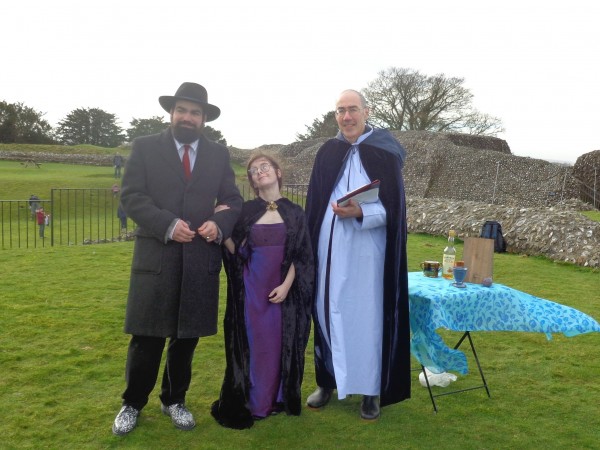
by Michael | Dec 7, 2015 | Blog
The Winter Solstice is almost upon us (depending when you read this!). It’s a fantastic time for a solstice handfasting.
“For what?” I hear some of you say.
Allow me to elaborate.
If you don’t know, I am assuming that you are not a Druid or pagan, and if you are, please understand that I am writing this for the uninitiated. There are, however, different kinds of handfastings, so there’s no single answer to the question.
Example of a handfasting
Remember when Kate and Prince William got married? Although it was a religious C of E ceremony, there was an element of handfasting in there when the couple took each other’s hands, and they were covered by a ribbon.
It was a lovely simple ritual.
Now if you take that one step further and bind the two hands together, you have a handfasting.
Incidentally, this gives rise to the expression “tying the knot” and also “bonds of holy matrimony”.
Origins
This ceremony probably originated in Celtic times; however, it flourished in Europe until the mid 1700s. Up till then, few unions were sanctified in a religious building like a church. Rather, they were celebrated by a simple handfasting ceremony in which the two partners joined hands over the village anvil, in the fields or in the groves of trees. Today, we build upon this tradition.
The basics
The couple link and cross hands (normally right hand to right, and left to left) to form an infinity circle, symbolising the entirety of the universe as represented in their relationship. Then, with a cord or ribbon (or ribbons), the wrists are tied and knotted, in a lovers’ knot, to the accompaniment of a suitable text, to symbolise the joining together of the two people in lives and spirits.
The cords are then removed, normally by the couple – occasionally, with difficulty! – with the knots still in place. They will take the cord away with them and, ideally, it will remind them of their vows, should they hit a rocky patch.
Where does this happen?
Again, it depends, but many people prefer a quiet, open-air historic site that may be considered to be spiritual and preferably pagan – such as standing stones.
What about Stonehenge?
A civil celebrant, such as myself, can conduct a handfasting wedding or vow renewal in the Inner Circle at Stonehenge (normally around dawn or dusk), but this needs to be booked months in advance (and the Druids will have priority at the solstice). However, places like Avebury, Old Sarum or the Rollright Stones might do very well.
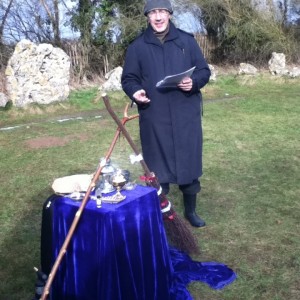
Michael raring to go at the Rollright Stones
It’s a little late for this Winter, but do have a chat (07931 538487) and see if we can sort something very special out for you for another time!
by Michael | Dec 4, 2015 | Blog
Before I became a Civil Celebrant, I had assumed that a civil ceremony was pretty much stress-free. It was arranged well in advance, so everybody knew what they were doing. You wouldn’t expect to encounter last-minute ceremonies, would you?
Experience has taught me that this is not always the case!
A last-minute job
Last summer, the family was all ready to go off for a week’s holiday. It was a Friday morning. The suitcases were literally on the doorstep and we were making our way out when the phone rang. I wanted to ignore it, but my wife took it anyway.
Would I be available to lead a ring blessing on Saturday evening (in 8 days)?
I explained my circumstances – I was sorry, but I wouldn’t be in a position to compile something suitable from abroad. I always e-mail out drafts for clients’ approval before I conduct ceremonies, and I am passionate about delivering a professional service. I could make no guarantees in this case.
I therefore gave them contact details of another civil celebrant who might be free, and told them that I’d try and access my e-mails on holiday. If they were still desperate, they could e-mail me and I’d see what I could do on the day itself.
Off we went, and I was able to see my e-mails. Nothing of note. We got back on Friday evening and I immediately checked e-mails again. Not a word.
So the following morning I was free to go out. Returning at lunchtime, there was a message for me. Could I please call them – after 2 p.m.?
It turned out that they did still want my services – with the ceremony due to start in the small matter of five hours!
I guess I wouldn’t be writing this, if there hadn’t been a happy ending!
Suffice it to say that that short phone call gave me an idea (no more than that!) of what was required. I couldn’t send the draft for approval (as it was to be a surprise for the wife, and their e-mail address was shared), and had to take pot luck and write what I judged would be suitable. Fortunately, they loved it and all was well!
The moral
Plan your civil ceremony well in advance and don’t rely on goodwill or chance! Your celebrant will do his best, but you can’t always rely on a happy ending.

by Michael | Dec 4, 2015 | Blog
In a recent blog, we spoke of the importance of participants understanding their roles and expectations of them, in order to achieve a wonderful wedding. We addressed the bride and groom plus their parents.
Now it is the turn of a few others to take the limelight.
The Best Man
You have a huge responsibility (so it’s possibly even more important that you do not get blind drunk).
- You need to keep the groom on schedule
- You need to check the groom hasn’t forgotten anything (a check-list is a great idea)
- You will probably be responsible for the ring
- Depending on what’s been arranged, you may need to look after logistics (eg helping the photographer organise the photo shoot or liaising with the venue over certain arrangements)
- You will presumably be delivering a major speech, At the very least, ensure your speech is clear, funny (if possible), inclusive, reasonably brief and in no way offensive (either personally, politically or religiously).
Maid of Honour
It’s worth having a bridal emergency kit ready on the day (safety pins, wipes, even chocolate). Reassure the bride wherever possible.
Ushers (groomsmen)
Exercise your charm when showing people to their places. At the reception, dance with single ladies (especially older ones). Be on your best behaviour (and that includes controlling your drink intake).
Bridesmaids
Ensure you are on time and ready on the day. Your job is to look beautiful and support the bride. Button up any negative criticisms you may have. Stay reasonably sober too.
Children
If children are participating, make sure they have been well briefed, that they understand their role and the behaviour that will be expected of them. If their patience is likely to be stretched during the ceremony, have somebody responsible keep an eye on them, and offer them distractions such as a book.
At the reception, there may be a children’s table and activities, but be prepared to occupy a potentially tired, bored and fractious child. And don’t get drunk out of your mind and expect others to look after your offspring!
I hope these tips will prove practical. They are the fruits of a celebrant’s observations of potential pitfalls and pratfalls. Most of the latter can be avoided relatively easily with sense and control. Good luck!
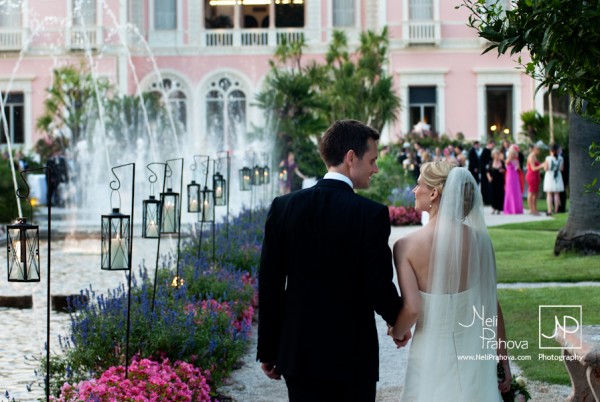
by Michael | Dec 4, 2015 | Blog
Of course, you want things to go well for your wedding. In fact, you want a wonderful wedding! But it doesn’t just depend on you. Does everybody understand their role?
Weddings can be a time of stress, so it’s important for people to make allowances.
As a civil celebrant myself, I have to point out that the celebrant should be able to play a role in smoothing the way much of the time, but not everything will be within their control!
Here is some advice for those playing an active role in the proceedings:
Bride
- Ensure you don’t get rolling drunk! Apart from anything else, there will be plenty of embarrassing photographic evidence to haunt you later in life. It may also not make the best possible impression on your new relatives!
- Try and make sure you speak to all your wedding guests (they have come to see and support you).
Bridegroom
- Much of the stress in the run-up to the wedding day is borne by the bride. Do what you can, especially on the day, to share the load.
- Don’t hide away with your mates; meet and make conversation with your new wife’s friends and even relatives.
- Don’t get rolling drunk! You have a speech to deliver effectively and the comments I aimed at the bride apply to you just as much.
The bride’s mother
It is good to remember whose big day it actually is – it’s really your daughter’s. So be there early, be willing to help, but don’t criticise either other people or arrangements. This just compounds any stress being experienced.
Be prepared to play second fiddle.
The Groom’s mother
As with the bride’s mother, be supportive rather than domineering or critical. Be helpful and open and say nice things to the bride! Don’t try and get revenge for a perceived slight during the wedding planning.
The Father(s)
Just like the bride and groom, you need to be sober and in control, not least when toasting the couple’s marriage.
Don’t use the opportunity to get even with somebody who you feel has affronted you during the wedding build-up.
If you want advice on the best man, maid of honour, ushers, bridesmaids and children, please be patient, as my very next blog will address this.
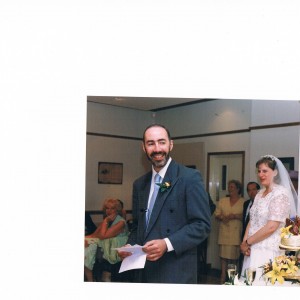
by Michael | Dec 3, 2015 | Blog
Wedding speeches form an integral part of most receptions. Traditionally, one is delivered by the bride’s father, one by the best man and one by the groom. For now, let’s concentrate on the latter.
The groom’s speech is an opportunity to help the guests know a little more about either or both of you – preferably, in a witty and enjoyable manner. It may well offer a public demonstration of your affection and excitement. So there is a lot to get right (or wrong).
Elements
It is vital that the speech is not too long. Ten minutes will be quite long enough. It should focus on the bride – what she means to you, possibly how you met and maybe an anecdote that shows why you chose her. Crucially, it should be sincere.
Incidentally, don’t hold back from saying “my wife and I”, if you wish.
Of course, you need to thank everyone who contributed to the wedding (not just financially!). So it should be the parents of the bride, the participants (bridesmaids, ushers, etc.) and the guests. Absent friends may be mentioned here. Without overdoing it, a bit about the best man could go in (preferably, including a story about something you both got up to in the murky past!). (Liaise with your best man beforehand so you don’t double up on the same story.)
Delivery
Don’t rely on memory (especially on such a day), nor should you read out from a long script. Use notes, so you can make eye contact with your audience as much as possible.
However, when you talk about your new wife, say what attracted you, why you love her, relate an interesting/humorous episode. For this, you can address your remarks directly to her. And a compliment is unlikely to be taken amiss (your guests will love it too!).
Try and vary your delivery, so it is not monotonous.
Speed
However nervous you may be, take your time! Don’t mumble or gabble. Speak loudly and clearly. People will really want to hear what you have to say, so don’t frustrate or deprive them!
Humour
If you can start with a joke, then that is fine. However, ensure any joke you tell is funny – and that it is not crude or offensive. If you are hopeless at telling jokes, then it may be better to leave them out altogether.
If you are going to include one, then, direct a gentle jest at your best man (NOT at your new in-laws, unless you are VERY sure that it is appropriate and that they will be OK with it! Definitely don’t get off on the wrong foot …).

I took a great risk at my wedding, because I chose to be quite rude about my new wife (but I did say some nice things too!). I got away with it (although, of course, I am still suffering the fall-out to this day!) because my comments were funny (no, really!), but it’s a dangerous game to play.
Finish
Once you’ve thanked everybody, told a story or two and possibly talked about your excitement at the prospect of your new life, stop while you’re ahead. Propose a toast to the bridesmaids and/or your wife and then pass the microphone to your best man.
Notes
- Don’t forget to thank your in-laws or whoever financed the affair. Thank your father-in-law for his speech (and for producing such a wonderful daughter). Thank everybody on behalf of your wife too. Make mention of guests from afar, or special guests, your in-laws and your own parents. Don’t thank caterers, florists etc. who will have been paid for their services. Try not to spend too long thanking people.
- Don’t read out long lists.
- Resist the temptation to get blind drunk before your speech!
- Check beforehand with your best man that there’s no clash or excessive overlap/repetition in what you are both going to say in your speeches.
Prepare thoroughly beforehand, remember the tips about delivery, and you will manage a wonderful speech that you will enjoy making and that your guests will love hearing.
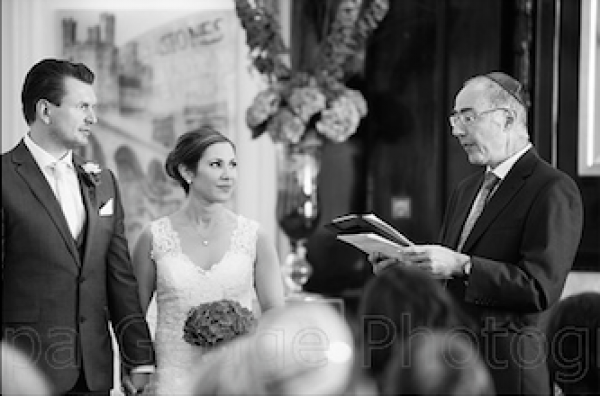
by Michael | Nov 30, 2015 | Blog
Mixed marriage is very common these days.
Not everybody can – or wants to – marry in a religious institution. Catholics will not allow divorcees to marry in church; same-sex ceremonies are not permissible in many churches; Christians and Jews, for example, can’t be married in either church or synagogue.
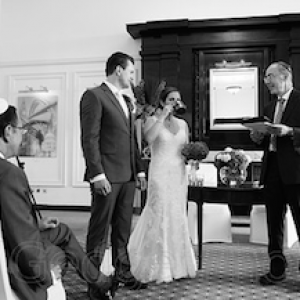 Photos: Philippa Gedge Photography
Photos: Philippa Gedge Photography
Of course, Register Offices offer an alternative (for any marriage, a registrar must always be involved to cover the legal requirements), but their services are standardised and limited (though they will suit some people fine, of course). These services must be totally non-religious. Which means that they often do not meet the needs or wishes of the couple or their families. That’s where the (non-humanist) civil celebrant can come in.
The civil celebrant will work with the couple to design the service that fits in with their beliefs. So it may be religious, part-religious or totally secular. It may contain rituals from a variety of religions and/or cultures.
The service will also be exactly as the couple want. So it is up to them what clothes will – or will not – be worn (I have been asked if I’d do a naturist wedding!). The couple can choose readings or poems, and also readers. There can be an address by the celebrant – checked in advance by the couple. They can have the choreography that they want, including the music. In short, absolutely everything can be approved by the couple before the day.
Logistically, there are a couple of decisions to be made.
- Should the register office ceremony take place a few hours – or a day or two – in advance? That way, the legal bit is covered by the time the couple come to the ‘real’ wedding ceremony, and they can relax and really enjoy their bespoke ceremony.
- Should the civil ceremony or blessing come straight after the legal marriage (at the same venue)? The ring blessing, for example, could be done by the civil celebrant, as could the vows. This way, the registrars could conduct a 10-15 minute ceremony, and the blessing ceremony could take around as long (depending).
The important thing on such a big day is to enjoy a memorable, meaningful ceremony – one which the couple and their guests will remember fondly for months and years to come. By creating a personalised service and conducting it professionally, a good civil celebrant will ensure this.







